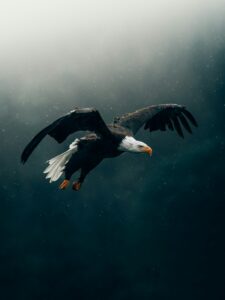The Eagle
nahīñ terā nasheman qasr-e-sultānī ke gumbad par tū shāhīñ hai baserā kar pahāḌoñ kī chaTānoñ meñ
You don’t have to make your nest on the dome of the Queen’s palace, oh Eagle,
you are royal, choose to reside on the peaks of mountains.
— Muhammad Iqbal (1915; trans. 1920)

We begin our journey into ethical leadership with the metaphor of The Eagle. Allama Iqbal’s poem challenges us to pursue greatness and to break the barriers that confine us. The “Queen” and her domain are not the height of royalty, rather, we draw from Iqbal the belief that we are all capable of royalty. We all have the capacity to be leaders on the peaks of our own mountains. The Eagle soars above all limitations; above the noise and distractions seeking out different perspectives. As Abdul Kalam poetically noted, “All Birds find shelter during a rain. But Eagle avoids rain by flying above the Clouds.” Over time the Eagle fortifies itself by developing resilience and new perspectives thus allowing it to soar beyond the ordinary.
As a leader, Mother Eagle encourages and teaches the Eaglet to fly from the nest, she gives the youth room to spread his wings, yet is near enough to swoop in when needed. The wind created by the mother’s wings provides lift and buoyancy, making it easier for the young Eagle to stay airborne and control his flight. This allows the Eaglet to experience flying with less effort, helping him gain confidence and develop the necessary skills to fly independently: easing the path to leadership for the young Eagle.
References
Nicholson, R. A. (tr. from original in Persian) (1920). Secrets of the Self (Asrar-i khudi): A philosophical poem by Sheikh Muhammad Iqbal. Macmillan & Co. https://archive.org/details/secretsofselfasr00iqbauoft/page/n5/mode/2up?view=theater

